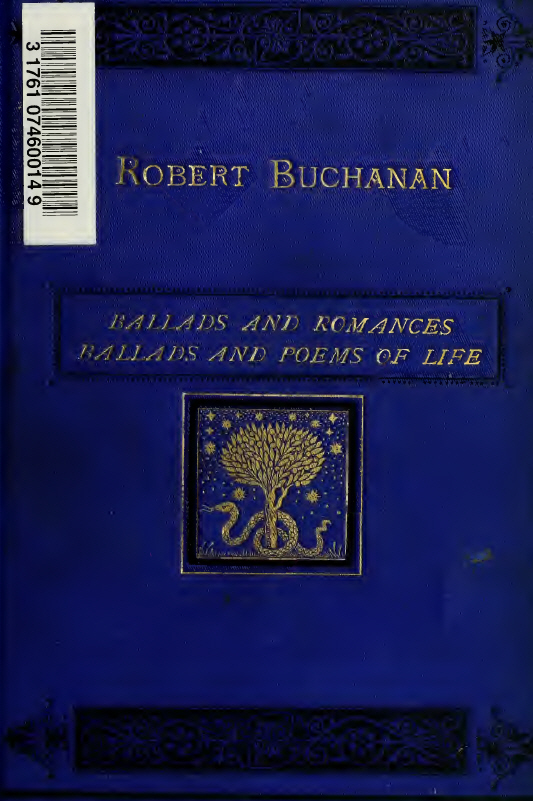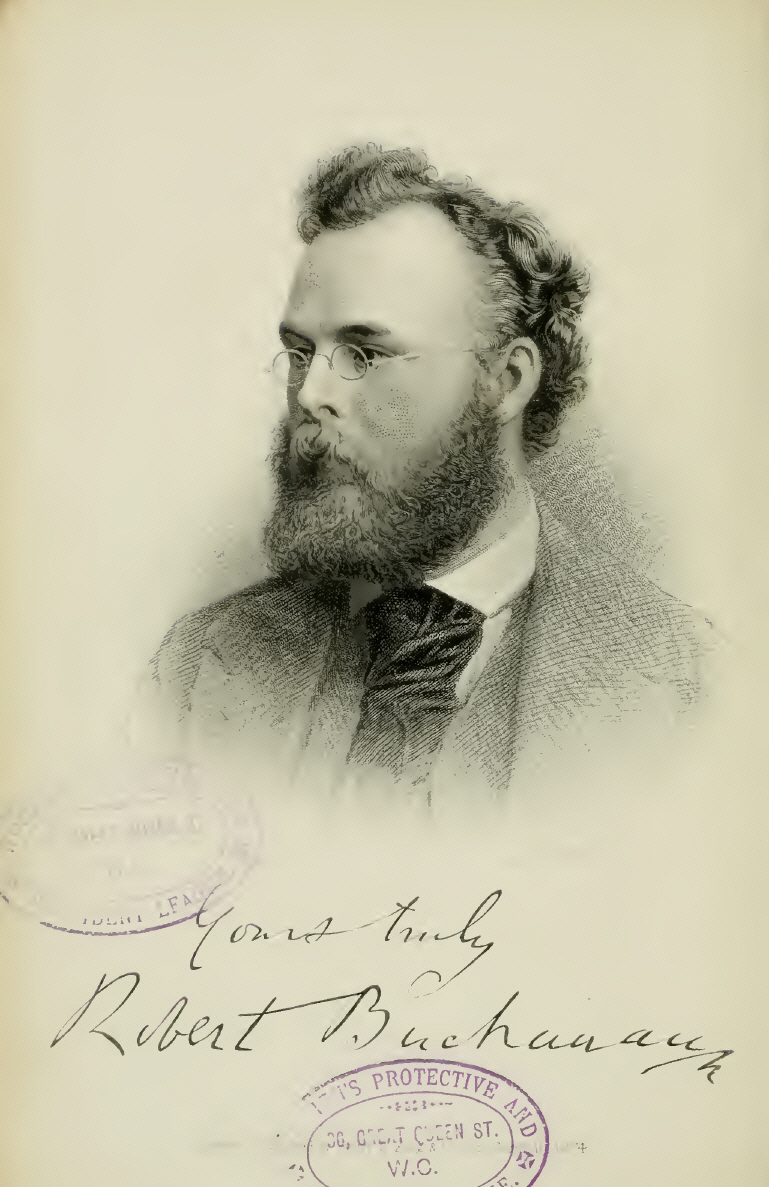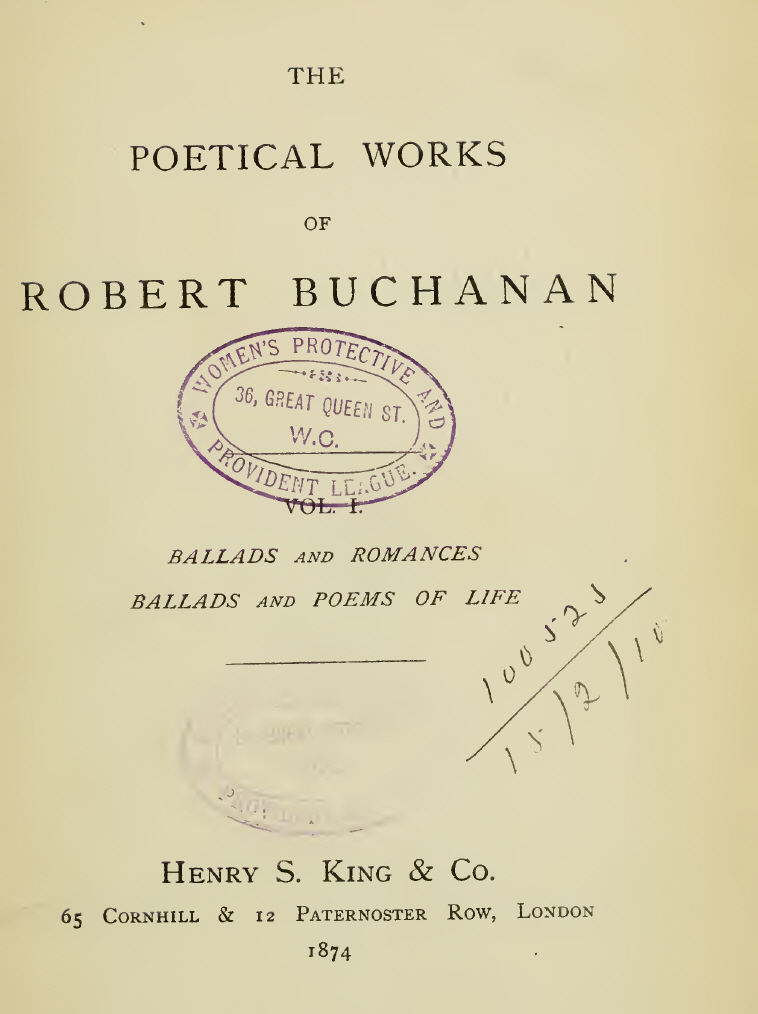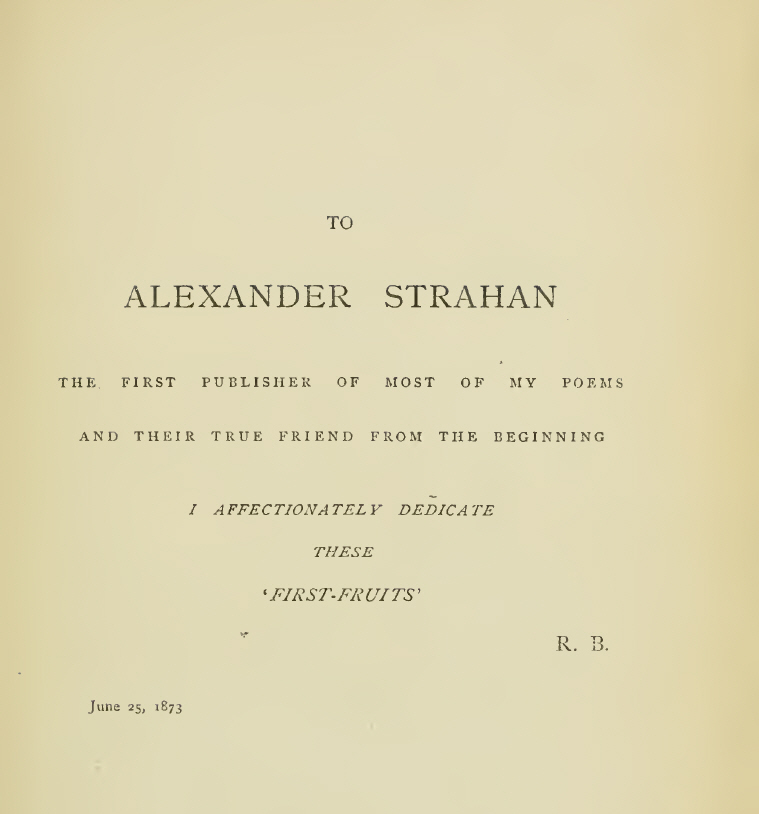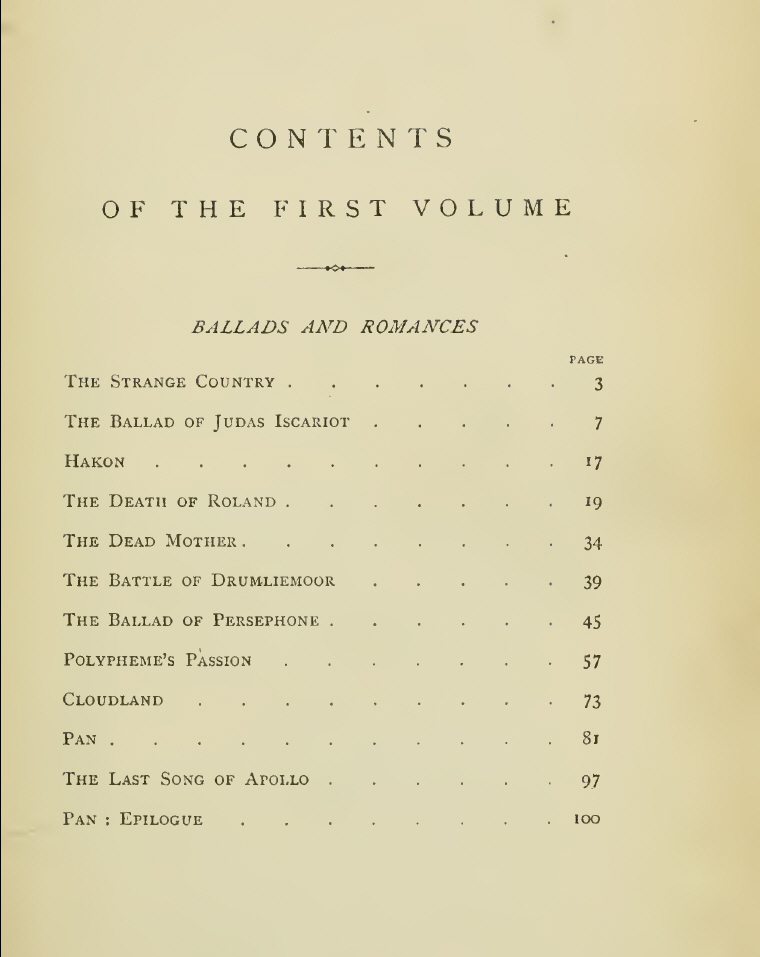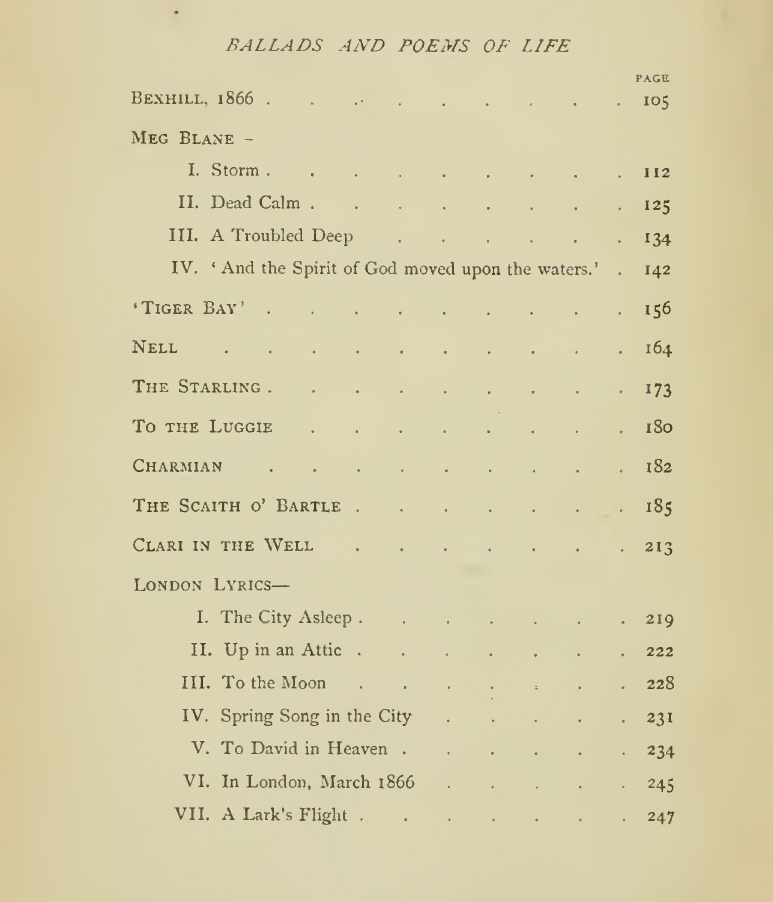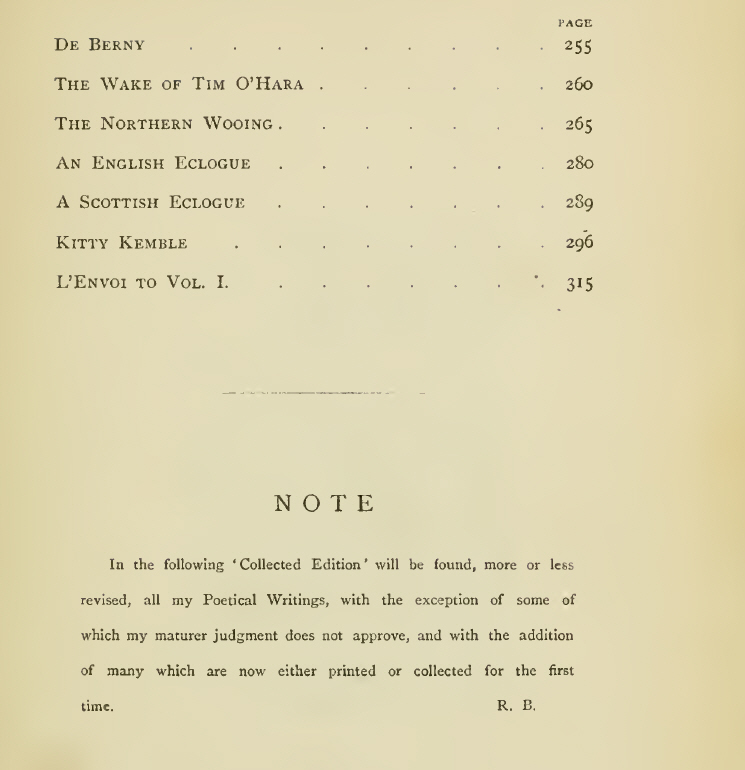|
To show the tyranny of majorities,
The cruelty of social fallacies;
To war against the Inquisition, whether
He who affirms the judgment swear by God,
Or by the fetish of a microscope;
To hold forth hope for every living thing;
To remind moralists that man’s worst crimes
Are not his crimes against society;
To speak in passion the one needful word
For Woman, vindicating from man’s lust
The white slave feminine of modern life;
To essay the Soul’s song in a troubled age
Of spiritual headsmen and police;
To put the Celtic glamour over eyes
Much troubled by the garish glare of day;
To fight oppression, to assail the Flesh,
To raise the basest and to brand the best—
Go forth, O Songs—bread cast upon the water,
Return to me (if ye do return)
Yonder, on the Great Ocean’s farther shore.
BALLADS AND ROMANCES.
As one looks on land and sea
Thro’ vast windows of stain’d glass,
Colour’d faint by fantasy,
Watch the wan Processions pass—
Linger here, but not for long
In the Past’s sick chamber stay;
Pass to fresher fields of song
In the living light of day.
‘The Strange Country’ - originally published in Good Words, March, 1872.
THE STRANGE COUNTRY
I HAVE come from a mystical Land of Light
To a Strange Country;
The Land I have left is forgotten quite
In the Land I see.
The round Earth rolls beneath my feet,
And the still Stars glow,
The murmuring Waters rise and retreat,
The Winds come and go.
Sure as a heart-beat all things seem
In this Strange Country;
So sure, so still, in a dazzle of dream,
All things flow free.
’Tis life, all life, be it pleasure or pain,
In the Field and the Flood,
In the beating Heart, in the burning Brain,
In the Flesh and the Blood.
Deep as Death is the daily strife
Of this Strange Country:
All things thrill up till they blossom in Life,
And flutter and flee.
Nothing is stranger than the rest,
From the pole to the pole,
The weed by the way, the eggs in the nest,
The Flesh and the Soul.
Look in mine eyes, O Man I meet
In this Strange Country!
Lie in mine arms, O Maiden sweet,
With thy mouth kiss me!
Go by, O King, with thy crownèd brow
And thy sceptred hand—
Thou art a straggler too, I vow,
From the same strange Land.
O wondrous Faces that upstart
In this Strange Country!
O Souls, O Shades, that become a part
Of my Soul and me!
What are ye working so fast and fleet,
O Humankind?
‘We are building Cities for those whose feet
Are coming behind;
‘Our stay is short, we must fly again
From this Strange Country;
But others are growing, women and men,
Eternally!’
Child, what art thou? and what am I?
But a breaking wave!
Rising and rolling on, we hie
To the shore of the grave.
I have come from a mystical Land of Light
To this Strange Country;
This dawn I came, I shall go to-night,
Ay me! ay me!
I hold my hand to my head and stand
Neath the air’s blue arc,
I try to remember the mystical Land,
But all is dark.
And all around me swim Shapes like mine
In this Strange Country;—
They break in the glamour of gleams divine,
And they moan ‘Ay me!’
Like waves in the cold Moon’s silvern breath
They gather and roll,
Each crest of white is a birth or a death,
Each sound is a Soul.
Oh, whose is the Eye that gleams so bright
O’er this Strange Country?
It draws us along with a chain of light,
As the Moon the Sea!
___
‘The Ballad Of Judas Iscariot’ - originally published in The Saint Pauls Magazine, February, 1872.
THE BALLAD OF JUDAS ISCARIOT
’Twas the body of Judas Iscariot
Lay in the Field of Blood;
’Twas the soul of Judas Iscariot
Beside the body stood.
Black was the earth by night,
And black was the sky;
Black, black were the broken clouds,
Tho’ the red Moon went by.
’Twas the body of Judas Iscariot
Strangled and dead lay there;
’Twas the soul of Judas Iscariot
Look’d on it in despair.
The breath of the World came and went
Like a sick man’s in rest;
Drop by drop on the World’s eyes
The dews fell cool and blest.
Then the soul of Judas Iscariot
Did make a gentle moan—
‘I will bury underneath the ground
My flesh and blood and bone.
‘I will bury deep beneath the soil,
Lest mortals look thereon,
And when the wolf and raven come
The body will be gone!
‘The stones of the field are sharp as steel,
And hard and cold, God wot;
And I must bear my body hence
Until I find a spot!’
’Twas the soul of Judas Iscariot,
So grim, and gaunt, and gray,
Raised the body of Judas Iscariot,
And carried it away.
And as he bare it from the field
Its touch was cold as ice,
And the ivory teeth within the jaw
Rattled aloud, like dice.
As the soul of Judas Iscariot
Carried its load with pain,
The Eye of Heaven, like a lanthorn’s eye,
Open’d and shut again.
Half he walk’d, and half he seemed
Lifted on the cold wind;
He did not turn, for chilly hands
Were pushing from behind.
The first place that he came unto
It was the open wold,
And underneath were prickly whins,
And a wind that blew so cold.
The next place that he came unto
It was a stagnant pool,
And when he threw the body in
It floated light as wool.
He drew the body on his back,
And it was dripping chill,
And the next place he came unto
Was a Cross upon a hill.
A Cross upon the windy hill,
And a Cross on either side,
Three skeletons that swing thereon,
Who had been crucified.
And on the middle cross-bar sat
A white Dove slumbering;
Dim it sat in the dim light,
With its head beneath its wing.
And underneath the middle Cross
A grave yawn’d wide and vast,
But the soul of Judas Iscariot
Shiver’d, and glided past.
The fourth place that he came unto
It was the Brig of Dread,
And the great torrents rushing down
Were deep, and swift, and red.
He dared not fling the body in
For fear of faces dim,
And arms were waved in the wild water
To thrust it back to him.
’Twas the soul of Judas Iscariot
Turned from the Brig of Dread,
And the dreadful foam of the wild water
Had splashed the body red.
For days and nights he wandered on
Upon an open plain,
And the days went by like blinding mist,
And the nights like rushing rain.
For days and nights he wandered on,
All thro’ the Wood of Woe;
And the nights went by like moaning wind,
And the days like drifting snow.
’Twas the soul of Judas Iscariot
Came with a weary face—
Alone, alone, and all alone,
Alone in a lonely place!
He wandered east, he wandered west,
And heard no human sound;
For months and years, in grief and tears,
He wandered round and round.
For months and years, in grief and tears,
He walked the silent night;
Then the soul of Judas Iscariot
Perceived a far-off light.
A far-off light across the waste,
As dim as dim might be,
That came and went like the lighthouse gleam
On a black night at sea.
’Twas the soul of Judas Iscariot
Crawl’d to the distant gleam;
And the rain came down, and the rain was blown
Against him with a scream.
For days and nights he wandered on,
Push’d on by hands behind;
And the days went by like black, black rain,
And the nights like rushing wind.
’Twas the soul of Judas Iscariot,
Strange, and sad, and tall,
Stood all alone at dead of night
Before a lighted hall.
And the wold was white with snow,
And his foot-marks black and damp,
And the ghost of the silvern Moon arose,
Holding her yellow lamp.
And the icicles were on the eaves,
And the walls were deep with white,
And the shadows of the guests within
Pass’d on the window light.
The shadows of the wedding guests
Did strangely come and go,
And the body of Judas Iscariot
Lay stretch’d along the snow.
The body of Judas Iscariot
Lay stretched along the snow;
’Twas the soul of Judas Iscariot
Ran swiftly to and fro.
To and fro, and up and down,
He ran so swiftly there,
As round and round the frozen Pole
Glideth the lean white bear.
’Twas the Bridegroom sat at the table-head,
And the lights burnt bright and clear—
‘Oh, who is that,’ the Bridegroom said,
‘Whose weary feet I hear?’
’Twas one look’d from the lighted hall,
And answered soft and slow,
‘It is a wolf runs up and down
With a black track in the snow.’
The Bridegroom in his robe of white
Sat at the table-head—
‘Oh, who is that who moans without?’
The blessed Bridegroom said.
’Twas one looked from the lighted hall,
And answered fierce and low,
‘’Tis the soul of Judas Iscariot
Gliding to and fro.’
’Twas the soul of Judas Iscariot
Did hush itself and stand,
And saw the Bridegroom at the door
With a light in his hand.
The Bridegroom stood in the open door,
And he was clad in white,
And far within the Lord’s Supper
Was spread so broad and bright.
The Bridegroom shaded his eyes and look’d,
And his face was bright to see—
‘What dost thou here at the Lord’s Supper
With thy body’s sins?’ said he.
’Twas the soul of Judas Iscariot
Stood black, and sad, and bare—
‘I have wandered many nights and days;
There is no light elsewhere.’
’Twas the wedding guests cried out within,
And their eyes were fierce and bright—
‘Scourge the soul of Judas Iscariot
Away into the night!’
The Bridegroom stood in the open door,
And he waved hands still and slow,
And the third time that he waved his hands
The air was thick with snow.
And of every flake of falling snow,
Before it touched the ground,
There came a dove, and a thousand doves
Made sweet sound.
’Twas the body of Judas Iscariot
Floated away full fleet,
And the wings of the doves that bare it off
Were like its winding-sheet.
’Twas the Bridegroom stood at the open door,
And beckon’d, smiling sweet;
’Twas the soul of Judas Iscariot
Stole in, and fell at his feet.
‘The Holy Supper is spread within,
And the many candles shine,
And I have waited long for thee
Before I poured the wine!’
The supper wine is poured at last,
The lights burn bright and fair,
Iscariot washes the Bridegroom’s feet,
And dries them with his hair.
___
‘Hakon’ - from North Coast and Other Poems, 1867.
‘The Death Of Roland’ - from London Poems, 1866.
‘The Dead Mother’ - from Idyls and Legends of Inverburn, 1865, where its original title was ‘The Legend Of The Stepmother’.
‘The Battle Of Drumliemoor’ - from North Coast and Other Poems, 1867.
‘The Ballad Of Persephone’ - from Undertones, 1863. This is a revised version of ‘Ades, King Of Hell’, which only appears in the 1874 King edition of the Poetical Works.
THE BALLAD OF PERSEPHONE
RING’D by a rayless realm, alone,
Far from the sense of sun and shower,
A palpable god with godlike power,
He, Ades, dwelt upon a Throne;
Much darkness did his eyelids tire;
But the deep demiurgic fire
Lent to his loneness impulse, hope, thought, passion, and desire.
Eternities of lonely reign,
Full of faint dreams of day and night,
And glamour white of starry light,
Oppress’d his patience into pain;
Upward he sent a voice of prayer
That made a horror in the air:
And ‘Ades seeks a Queen, O gods!’ shook Heaven unaware.
The gods stopt short in full carouse,
And listen’d. On the streams of Hell
The whole effulgent conclave fell
As in a glass. With soft-arch’d brows,
And wings of dewy-tinctured dye,
Bright Iris listen’d blushingly;
And Heré sought the soul of Zeus with coldly eager eye.
Then the clear hyaline grew cold
And dim before the Father’s face;
Gray meditation clothed the place;
And rising up Zeus cried, ‘Behold!’—
And on the light Olympian wall
A Phantom mystical and tall,
Throned, sceptred, crown’d, was darkly apparition’d at the call.
‘Behold him!’ Zeus the Father cried,
‘Behold him, rayless and forlorn!’
Pale Hermes curl’d his lips in scorn,
And Iris drew her bow aside;
Artemis smiled and did not speak;
A blush flush’d Aphrodite’s cheek;
And only owl-eyed Pallas look’d with pitying smile and meek.
A weary night thro’ earth and air
The shadow of his longing spread,
And not a goddess answerèd.
All nature darken’d at the prayer;
Deep darkness earth and air did shroud,
No star rain’d light, but, pale and proud,
With blue-edged sickle Artemis cut her cold path thro’ cloud.
And when the weary night was done,
Beyond the rayless realm upsprang,
With smile that shone and harp that rang,
Apollo, piloting the Sun;
And conscious of him shining o’er,
Dark Ades watch’d the watery floor
Wherein the fair green upper-world is shadow’d evermore.
When lo, there murmur’d on his brain,
Like sound of distant waves, a sound
That did his godlike calm confound
And kiss’d his eyelids down in pain;
And far above he heard the beat
Of musically falling feet,
Hurl’d by the echoes of the earth down to the sunless Seat.
And shadow’d in that sunless glass
He saw the Image of a Maid,
Who gather’d flowers in a green glade
Knee-deep in dewy meadow-grass,
And on a riverside. Behold,
The sun that robed her round with gold,
Mirror’d beneath him raylessly, loom’d white and round and cold.
Soft yellow hair that curl’d and clang
Throb’d to her feet in softest showers,
And as she went she gather’d flowers,
And as she gather’d flowers she sang:
It floated down his sulphurous eaves,
That melody of flowers and leaves,
Of vineyards, gushing purple wines, and yellow slanted sheaves.
Darkling thought Ades, ‘’T would be choice
Proudly to throne in solemn cheer
So fair a Queen, and ever to hear
Such song from so divine a voice!’
And with the wish he upward breathed
A mist of fire that swiftly seethed
Thro’ shuddering earth-seams overhead, and round her warm knees wreathed.
Whereon the caves of precious stones
Grew bright as moonlight thrown on death,
And red gold brighten’d, and the breath
Drew greenness moist from buried bones;
And every cave was murmuring:
‘O River, cease to flow and sing,
And bear the tall Bride on thy banks to the footstool of thy King!’
Then writhed the roots of forest trees
In tortuous fear, till tremblingly
Green leaves quaked round her. A sharp cry
Went upward from the Oreades;
Low murmurs woke in bower and cave,
With diapason in the wave:
The River eddied darkly round, obeying as a slave.
Half stooping downward, while she held
A flower in loosening fingers light;
The quick pink fading from the white
Upon her cheek; with eyes that welled
Dark dreamy gleams from veins that dart
Between the bright brain and the heart,
And balmy breath that mildly blew her rose-red lips apart,—
Listen’d that Maiden fair and tall
Now dimly conscious of some change
That made the whispering place seem strange
And awful, far from human call;
And as the moaning Stream grew near,
And whirl’d unto her with eddies clear,
She saw Hell’s glimmer in his gaze and shrank away in fear.
‘O River, sweet with summer sound,
Strong River, solemn Ades’ slave,
Flow unto her with gentle wave,
And make an isle, and hem her round.’
The River, sad with gentle worth,
Fell backward to that cave of earth
Where, troubled with Hell’s crimson eyes, he shudder’d into birth.
Him saw she trembling; but unseen,
Under long sedges lily-strew’d,
Round creeping roots of underwood,
Low down beneath the grasses green
Whereon she waited wondering-eyed,
The waters slid with stealthy tide:—
Then like a fountain bubbled up and foam’d on either side!
And shrinking back she gazed in fear
From off an ever narrowing isle—
Around whose brim waves rose the while
She cried, ‘O mother Ceres, hear!’
Then sprang she wildly to and fro,
Wilder than rain and white as snow;
‘O honour’d River, grasp thy prize, and to the Footstool flow!’
One sunbeam swift with sickly flare
On white arms waving high did gleam,
What time she shriek’d, and the strong Stream
Leapt up and grasp’d her by the hair.
And all was dark. With wild heads bow’d
The forests murmur’d, and black cloud
Split spumy on the mountain tops with fire and portent loud!
Then all was still as the Abyss,
Save for the dark and bubbling water,
And the far voice. ‘Bear Ceres’ daughter
Unto the kingly feet of Dis!’
When Ades rose upon his Throne,
And smote his kingdom’s roof of stone;
Earth moan’d to her deep fiery roots—Hell echoed with a groan.
When swiftly waving sulphurous wings
The Darkness brooded down in fear
To listen: every shade could hear
The coming River’s murmurings;
And Ades’ eyes with flash of flame
Peer’d up the chasm. As if in shame
Of his slave-deed, darkly and slow, the trembling River came.
The gentleness of summer light,
This Stream, dark Ades’ slave, possessed:
The blue flowers mirror’d in his breast,
And the meek lamps that sweeten night,
Had made his heart too mild to bear
With other than a gentle care,
And slow sad solemn pace, a load so violet-eyed and fair.
So silently thro’ looming rocks
He glimmer’d like a serpent gray
Whose moist coils hiss; then, far away,
Lo the dim gleam of golden locks,
Lo a far gleam of glinting gold,
Floating in many a throbbing fold,
While rippling low he softly kissed those queenly eyelids cold.
Silently, with obeisance meet,
In gentle arms escorting well
The partner of eternal Hell,
Thus flowed unto his Master’s feet
The gracious River with his load:
Her with dark arm-sweep he bestow’d
On the great footstool—then again, with sharp shriek, upward flow’d.
So fair, so fair, so strangely fair,
Dank from the waters lay his love;
And lo, he, Ades, stoop’d above,
And shuddering touch’d the yellow hair
That made his beaded eyeballs close—
Awful as sunshine. Cold as snows,
Pale-faced, dank-lidded, proud, she lay in wonderful repose.
And all the lesser Thrones that rise
Round Ades shook. With murmurous breath,
Their Kings shook off eternal death,
And with a million fiery eyes
Glared red above, below, around,
And saw him stooping fiery-crowned;
And the white faces of the damn’d arose without a sound.
As if an awful sunbeam, rife
With living glory, pierced the gloom,
Bringing to spirits dark with doom
The summers of forgotten life,—
Those pallid faces, mad and stern,
Rose up in foam, and each in turn
Roll’d downward, as a white wave breaks, and seem’d to plead and yearn.
What time this horror loom’d beyond,
Her soul was troubled into sighs:
Stooping, crown’d Ades touch’d her eyes
With dim and ceremonial wand;
And looking up, she saw and knew
An awful love which did subdue
Itself to her bright comeliness and gave her greeting due!
‘Welcome!’—The rocks and chasms and caves,
The thousand Thrones and their black Kings,
The very snakes and creeping things,
The damn’d within the wailing waves,
Groan’d ‘Welcome;’ and she heard—with light
Fingers that writhed in tresses bright;—
But when he touch’d her to the soul, she slowly rose her height.
Low at her feet, huge Cerberus
Crouch’d groaning, but with royal look
She stooping silenced him, and took
The Throne sublime and perilous
That rose to hold her and upstream’d
Vaporous fire: the dark Void scream’d,
The Sisters of the fire made moan, with eyes and teeth that gleam’d.
Behold, she sits by Ades now,
A weighty sorrow in her mien,
Yet gracious to her woes—a queen!
The sunny locks about her brow
Shadow’d to godhead solemn, meet;
Throned, queen’d; but round about her feet,
Sweeten’d by gentle grass and flowers, the brackish waves grow sweet.
And surely when the Mirror dun
Beneath him shadows yellowing leaves
And reapers binding golden sheaves,
And vineyards purple in the sun,
When fulness fills the plenteous year
Of happy mortals, she can hear
The voice among the harvest-fields that mourns a daughter dear.
And in the seed-time after snow,
Down the dark ways in soft distress,
Dry corn-blades tangled in her dress,
The mother-goddess wanders slow—
The million eyes of Hell are bent
On their strange Queen in wonderment,—
The ghost of Iris gleams across the waters impotent!
And the sweet Bow bends mild and bland
O’er rainy meadows near the light,
When fading far along the night
They wander upwards hand in hand;
And darkling Ades doth remain,
Chain’d to a Throne in lonely reign,
Till, sweet with greenness, moonlight-kiss’d, she wanders home again.
But when afar thro’ rifts of gold
And caverns dark, he heareth beat,
Those musically falling feet,
His kingdom totters as of old;
And, conscious of her sweeter worth,
Her godhead of serener birth,
Hell, breathing fire thro’ flowers and leaves, feels to the Upper-earth.
_____
The Poetical Works of Robert Buchanan, Vol. I - continued
or back to Collections
|
